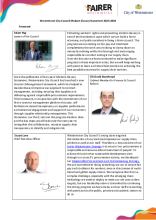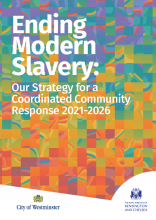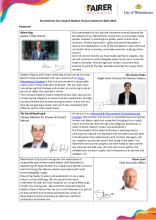What is modern slavery?
Modern slavery is an umbrella term which encompasses human trafficking, slavery, servitude, and forced or compulsory labour. Simply put, modern slavery describes a situation where someone is made to do something, and another person gains from this.
Modern slavery is not new or a phenomenon that can be removed from our everyday lives. Modern slavery and exploitation is happening here, in our neighbourhoods and communities. Exploiters use deception or coercion to control people, including threats to lives, debt bondage or abuse of power and vulnerability.
Exploitation can include:
- Forced labour – being made to work for little or no money
- Sexual exploitation – coerced or forced into selling sex
- Domestic servitude – forced to work within a home environment for little or no pay
- Criminal exploitation – forced to break the law for someone else, such as begging or selling drugs
- Forced/sham marriage – forced to marry someone without consent
- Organ harvesting – organ removal for financial gain
Who is affected?
Modern slavery can affect anybody regardless of age, gender or ethnicity. Children are particularly vulnerable to modern slavery; if a child is exploited through modern slavery, it is child abuse.
Modern slavery is often hidden in plain sight. Those impacted may be unable to escape for many reasons, for example, fear for their lives or the lives of their family. It can be confusing for victims to know where to seek help or who they can trust.
What can be done?
Working with the Royal Borough of Kensington and Chelsea and charity partners, we are committed to ending modern slavery in both boroughs. This is why we have come together to produce a five-year Modern Slavery and Exploitation Strategy to demonstrate how we are responding to the issue and most importantly, how we can all play a role in ending modern slavery.
We are asking all residents, local businesses, organisations and visitors to Westminster to take responsibility for helping us end modern slavery.
There are several common signs to look out for; someone who is experiencing modern slavery may:
- be forced or coerced to carry out specific activities
- have their movements or interactions controlled by someone else
- seem to be in debt bondage, being paid very little or nothing, or having money deducted from their salary
- have little or no contact with family or loved ones
- be distrustful or worried about interaction with authorities
- show signs of physical or psychological abuse or have untreated medical conditions
- have threats made against themselves, family members or loved ones
- not have their own legal documents
- live in poor accommodation and/or have little or no personal possessions
Locally, we have adopted the Coordinated Community Response (CCR) approach, which sets out a shared understanding of how we plan to jointly tackle this issue over the next five years. The CCR model highlights the role everyone plays in ending modern slavery. The CCR approach will support Councils, partner agencies, community groups, and residents to work together, so individuals who seek help don’t fall through the gaps.
In 2021 Westminster City Council and the Royal Borough of Kensington and Chelsea was shortlisted for the Human Trafficking Foundation’s Statutory Services Award for the work undertaken by the Councils and partners to combat modern slavery.
How to get involved
We are asking all residents, local businesses and visitors to Westminster, Kensington and Chelsea to take responsibility to help us to end modern slavery.
For communities, there are numbers of common signs that someone is being exploited:
- acting as if they are being forced or coerced to carry out specific activities
- showing signs of physical or psychological abuse or has untreated medical conditions
- seeming to be bonded by debt or has money deducted from their salary
- having little or no contact with family or loved ones
- being distrustful of authorities
- having threats made against themselves or family members
- not being in possession of their own legal documents
Locally, we have adopted the Coordinated Community Response (CCR) approach, which sets out a shared understanding of how we plan to jointly tackle this issue over the next five years. The CCR model highlights the role everyone plays in ending MSE.
The CCR approach will support both councils, partner agencies, community groups, and residents to exchange information and ideas and offer support so that individuals who seek help don’t fall through the gaps. At times, a survivor of modern slavery will encounter dozens of different agencies. Each one holds a piece of the puzzle, and by responding appropriately and working together, we can ensure that the right help is offered at all times.
What's next
Next steps
- Download the five-year Modern Slavery and Exploitation Strategy below.
- Contact Charlotte Jamieson at charlotte.jamieson@rbkc.gov.uk to request training or to talk more about how your organisation can contribute towards our responsibility to end modern slavery.
- Visit the Local Safeguarding Children’s Partnership (LSCP) website to sign up for training on child trafficking and modern slavery if you are a professional working with children in Westminster.
How to respond to concerns about modern slavery
- Report incidents of concern by calling 999 in an emergency or 101 in a non-emergency.
- Seek 24-hour advice from the Modern Slavery & Exploitation Helpline on 08000 121 700.
- If you are concerned about a child being exploited, contact the police and make a referral to Westminster Children’s Services at 020 7641 6000.
- Explore our local directory of services for modern slavery on the Angelou website.




